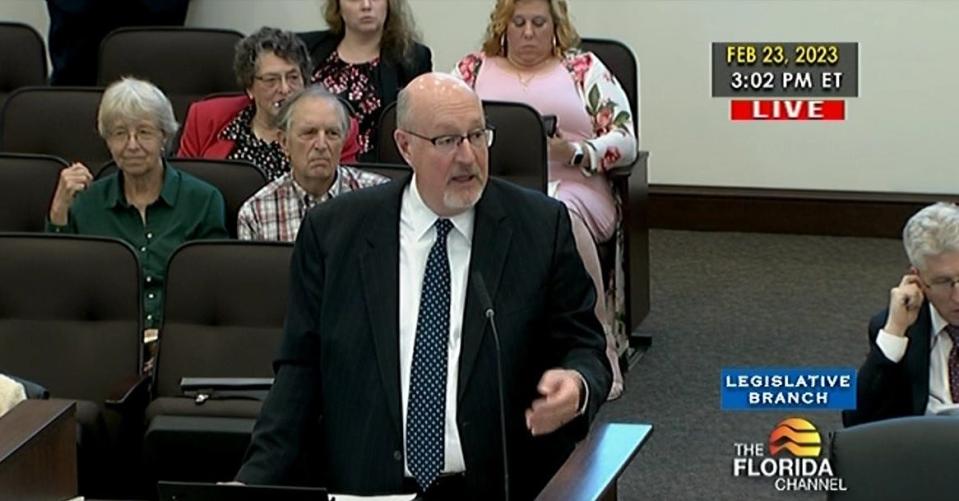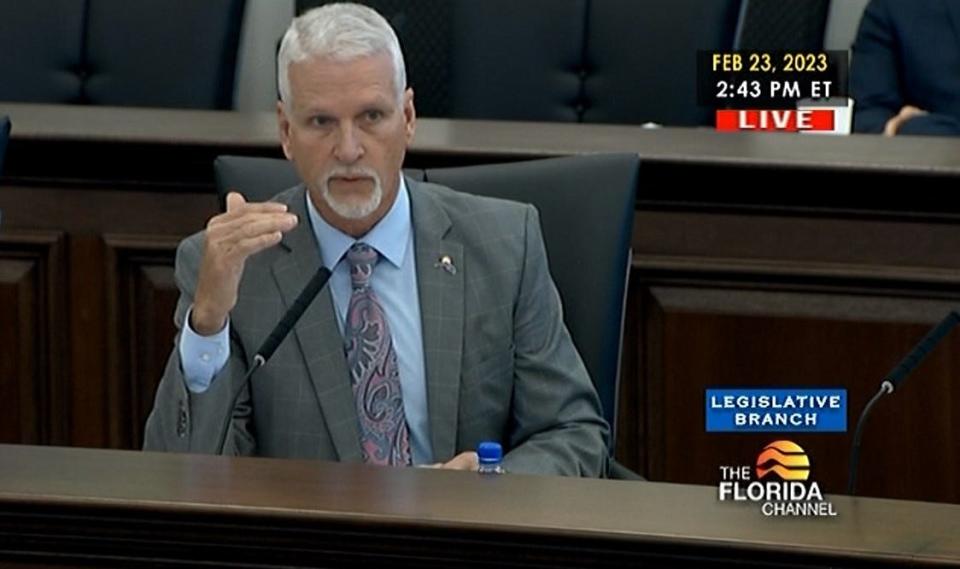Lawmakers grill Gainesville officials over utility management, debt
Gainesville officials were met with strong pushback from lawmakers in Tallahassee over their handling of the municipal-owned utility and its increasing debt.
Democrats and Republicans shared concern over the issue and sent a clear message: Fix it or risk being removed from office.
The Florida Joint Legislative Auditing Committee, comprised of Senate and House members, grilled the city officials Thursday afternoon over findings outlined in a January 2022 auditor general’s report that found problems with Gainesville Regional Utilities’ rising debt levels, amount of money channeled to City Hall and high electric rates. Also of conversation was a recently negotiated 20-year solar contract amendment that allows Gainesville to purchase solar power from a company at a cost not known to taxpayers due to a trade secret clause.
Lawmakers expressed grave concern for the sustainability of the city’s future given its challenges outlined in the report. And while the findings have been a hotly debated topic since its release last year, one lawmaker said it didn’t go far enough.
“If we could have sound effects in here with lightning and fire and thunder, I think that would show the magnitude of what this audit has kind of touched on,” said Rep. Mike Caruso, R-Delray Beach.
More:City owns GREC after $754M deal
More:Gainesville leaders approve large-scale solar farm project
In December 2021, The Gainesville Sun reported findings of a preliminary audit that showed lax fiscal controls and poor oversight of the city government and its Reichart House youth program. At the time, city officials downplayed the report, with then-mayor Lauren Poe calling the investigation “politically motivated” and pointing to the void of leadership within the finance department as being a national problem.
Even so, since the final report’s release more than a year ago, the city acknowledged Thursday that it has only fully addressed five of the report’s 18 findings. Mayor Harvey Ward told the committee that he was hopeful for the future given the city's recent change in leadership and new charter officers who control the very departments in question.

“There’s no doubt that our electric service is high compared with other Florida utilities, with the average electric service outpacing neighboring Duke Energy by about $6 a month,” Ward told the committee, who added the water rates are among the most competitive in the state. “Our electric utility provides some of the highest ‘up times’ in Florida and has never in its history suffered a blackout. This past year, our electric customers had full access to power 99.99% of the time, which is an amazing statistic here in Florida.”
Ward also noted the second consecutive reduction of $2 million from the general fund transfer (GFT) − a pot of money that transfers from GRU to City Hall to pay for other municipal services. Currently, the city’s GFT is set around $34, the lowest its been since 2009, Ward added.
Still, lawmakers argued the savings pale in comparison to GRU’s amassed $1.7 billion in debt, much of which was acquired when the city exited a costly, controversial biomass contract, GRU General Manager Tony Cunningham said.
“What I see here is a GRU that is on the verge of failing and a city that will tumble after it,” Caruso said.
Biomass-ing debt
In 2009, city officials entered into a deal with the owners of the newly built GainesvilleRenewable Energy Center (GREC) to supply renewable energy to the city at a time when there was uncertainty over costs for other power supply options. The deal was a 30-year contract for an estimated $2.1 billion, or $70 million annually, even if the city didn't use it.
A decade later, however, the contract ended up being one of the worst biomass deals in the country's history.
Officials saw only one way out: Buying it.
GRU's leadership negotiated a deal to buy the plant for $757 million in 2017, despite it only costing about $450 million to build. But the purchase was largely about exiting an unfavorable contract, not the facility itself.
City officials said it would have long-term savings of about $1 billion and cut electric bills by up to 10%. But added pressures to increase rates and mounting debt caused those bills to climb back up. Currently, Gainesville has the second-highest residential bills in the state among all utilities, nearly $20 higher than Duke, according to the Florida Municipal Electric Association.
When asked about the city’s comprehensive plan to fully address the debt issue, officials said there were only a series of steps aimed at lowering the trajectory but that there was no long-term plan.
Rep. Yvonne Hayes Hinson, D-Gainesville, who joined the meeting and is a former Gainesville commissioner, was among the group who expressed concern by the response.
"I believe, this is me talking, you need to go back and take a hard look and be tough about what you do and how you do it," she said. "This is not a future payment plan. You need to find this money now."
Also joining the hearing was Sen. Keith Perry, R-Gainesville, who helped bring the discussion before the Legislature. Over the years, he has advocated taking away the City Commission's ability to make GRU-related decisions, a move voters have already rejected. Some believed Thursday's meeting was another step toward that goal.
Perry pressed Ward on his continual support of having Gainesville on 100% renewable energy by 2045, which consultants have estimated would add up to $900 million in debt. Ward said he did not have the desire to add that much debt, though he has publicly supported the renewable energy goal.
City officials have previously argued that the estimate doesn't factor in expenses spread out over time and new technologies, but they have failed to provide an estimate of what it would cost in totality.
"You want to be net-zero. That's a goal, that's understandable," Perry said to Ward. "I think what we deserve is − what does that cost?"

Derek Noonan, a state audit manager who gave the presentation to the committee, said the city could choose to modify its current energy fleet for about $250 million, but noted that plan would still add debt, too.
“Utilities are debt-generating machines,” he said.
Credit downgrades have only increased those costs. Despite downplaying the most recent downgrade, officials for the first time acknowledged that it had a negative $30 million impact.
More:Gainesville sees credit rating drop due to collective debt with utility
Lawmakers also questioned a solar power purchase agreement approved − and celebrated − by the Gainesville City Commission last week. The plan calls for GRU to buy solar energy from Origis, though officials say the cost of power can’t be revealed.
Cunningham assured lawmakers that the deal provided cheaper power to customers compared to current options.
Cunningham and Ward were repeatedly asked why they would approve a deal that the public can’t see, similar to how the original biomass contract was managed. They said it was the preference of Origis, but the answer didn’t appear to satisfy committee members.
Finding a solution
The utility’s debt spreads out to about $22,000 per customer, some lawmakers noted.
Sens. Tracie Davis, D-Jacksonville, and Jason Brodeur, R-Lake Mary, were among those who said the city should seriously consider raising property taxes, cutting jobs, cutting city services and ridding the GFT entirely.
Davis said she wants to be supportive of Gainesville’s leadership but was struggling to see a path forward that didn’t further burden local residents.
“I’m thinking about the communities in Gainesville that look like me, that cannot afford what you are talking about. We cannot afford these dollars and cents you’re talking about. I personally am having a hard time seeing Gainesville being sustainable,” she said. “What we really haven't heard is how do you get rid of that debt."
Though the management of Reichart House was discussed, it wasn't the focus of the hearing. The program has been run by Gainesville police and serves roughly 120 at-risk youth annually and aims to assist predominantly black adolescents into adulthood through military-like structure and lessons.
Noonan noted the questionable financial setup that allowed multiple not-for-profits to shield expenses within the program, which he said prevented the city from oversight and lacked transparency.
Many of the same issues within the program were previously highlighted in an internal investigation conducted by former city auditor Carlos Holt. The former auditor was publicly berated for his findings by attendees of a City Hall meeting, where some said the findings were racially motivated and tarnished the legacy of the program. Holt rejected the claims and said numerous times that the issues within the program could be solved quickly if action was taken.
The backlash ultimately played a role in Holt's termination from the city.
Several Gainesville residents, also regulars at City Hall, drove to the hearing to let lawmakers know they have continued to harp on the subjects at city meetings for years but said they often feel rejected and dismissed by those in power.
“We’ve been treated like lepers in there,” Jo Beaty said. “They don't want to hear the people that come all the time and say the same thing even though we do our research.”
At least three lawmakers vowed to show up to future city meetings and accompany the constituents to further discuss the subject and said they hope to have a follow-up report from Gainesville by Oct. 1, once a new budget is adopted, before seeking additional action.
“Our eyes are on it now,” said Sen. Jason Pizzo, D-Hollywood.
This article originally appeared on The Gainesville Sun: Gainesville officials answer questions on financial audit, GRU debt

